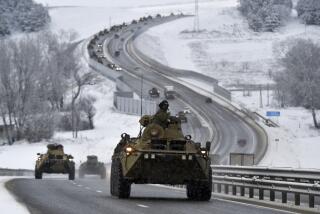U.S. Prepared to Back U.N. Sanctions Against Iran, Shultz Says
- Share via
WASHINGTON — The United States is prepared to support U.N. sanctions against Iran if the Iranian government continues to reject Security Council efforts to end the Iran-Iraq War, Secretary of State George P. Shultz told a visiting Arab League delegation Thursday.
In a statement read by State Department spokesman Charles Redman, the Reagan Administration said it will join other governments in international efforts “to persuade Iran to make peace.”
“The U.S. is ready in principle to support the application of appropriate enforcement measures against either party which refuses to cooperate with formal Security Council efforts to end the war,” Redman said. Although the statement referred to measures against either Iran or Iraq, the Iraqi government has said it is ready for peace negotiations while the Iranian government has not.
Redman did not spell out the kind of measures that might be invoked. The United States already has an embargo on trade with Iran.
Although Iraq began the war, by attacking Iran in September of 1980, the United States has long considered Iran to be the “intransigent party” because of its refusal to consider a negotiated settlement.
The Arab League delegation, led by Abdul-Karim Iryani, the deputy prime minister and foreign minister of Yemen, was in Washington in connection with an effort to enlist all five permanent members of the Security Council--the United States, the Soviet Union, Britain, France and China--in a campaign to put pressure on Iran.
Although the 15-member council has repeatedly urged a negotiated settlement to the war, it has not yet proposed sanctions. The Arab League, of which Iraq is a member but Iran is not, hopes to press the issue at a future council session.
“Along with many others, we have called for Iran to join Iraq in negotiations designed to bring about peace,” Shultz said in welcoming the delegation. “Unfortunately, Iran has not seen fit to join Iraq in such negotiations.
“Therefore, we must continue our efforts--as we have for many years--to deny arms to Iran, since it is those arms they use for war. The effort will continue while we press the international community to join efforts to bring about negotiations.”
The meeting gave Shultz an opportunity to try to convince the Arab leaders that the previous White House program of secretly selling arms to Iran in the hope of winning freedom for American hostages in Lebanon was an aberration that would not be repeated.
After the meeting, Clovis Maksoud, the Arab League’s representative to the United Nations, told reporters that Shultz had promised that the United States will pursue “more vigorously” its campaign to discourage other nations from selling arms to Iran.
“We have had our doubts before, but I think the reassurances that were given by the secretary of state have satisfied the delegation at this juncture,” Maksoud said.
Redman described the meeting as “very positive and productive.”
More to Read
Sign up for Essential California
The most important California stories and recommendations in your inbox every morning.
You may occasionally receive promotional content from the Los Angeles Times.













